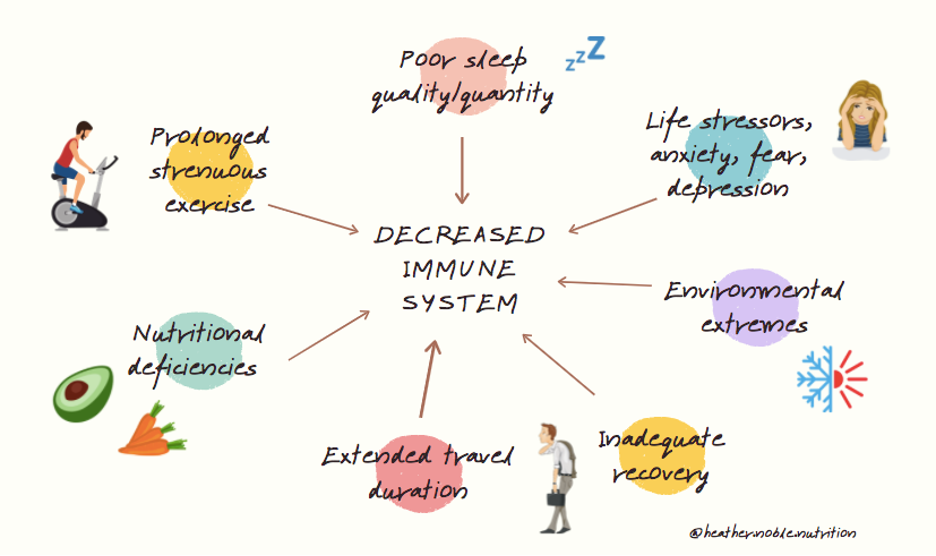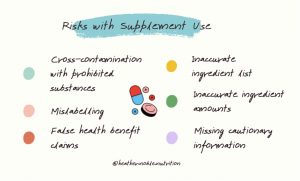by Heather Noble, RD
Are you sick of getting colds? Nutrition is one of many factors that play an important role in keeping your immune system strong and healthy. Your immune system protects against foreign pathogens to the human body- we literally cannot survive without it!
Injury or illness can significantly interrupt training blocks, training adaptation, and can make it or break it on race day performance.
The following image shows some key factors that can lower immunity in athletes:

Image adapted from Walsh 2018 Eur J Sports Sci 18(6):820-831
How can you strengthen your immune system?
- Vitamin D
Vitamin D is a key nutrient for a strong immune system, bone health, and supporting muscle function. Vitamin D deficiency is also very common in athletes- especially those who train indoors, live in parts of the world with long dark winters, and who are exposed to limited amounts of sunlight. Many studies have shown that upper respiratory infection rates in athletes are highest in those who are Vitamin D deficient, and were also subject to a greater severity and duration of illnesses.
Vitamin D is found in small quantities in some foods, including fatty fish, egg yolk, and fortified foods such as milk, margarine, soy beverages and orange juice.
Health Canada recommends that people over the age of 50, take a daily supplement of Vitamin D3 of 400 IU (International Units) daily. It is also recommended for athletes to take a 400 IU Vitamin D3 supplement during periods of low sun exposure. Please speak with a medical professional or Registered Dietitian before taking high doses of Vitamin D supplements or if you currently have a Vitamin D deficiency.
- Ingest simple carbohydrates during prolonged exercise sessions
Ingesting 40-60g of carbohydrates per hour during prolonged exercise has been seen to reduce the rise in anti-inflammatory cytokines and stress hormones therefore, minimizing exercise-induced immune function suppression.
During prolonged exercise (>90 mins) or repeated bouts of intense exercise, blood glucose decreases significantly and glycogen stores become depleted (stored carbohydrates in muscle and liver). Glucose is also an important fuel source for the cells of the immune system therefore, providing an exogenous source of carbohydrate during exercise has been shown to help support immune function.
However, other aspects of immune system suppression are not prevented by ingesting carbohydrates during exercise (including natural killer cell cytolytic activity, B cell function, and salivary IgA). Therefore, ingesting carbohydrates aids to preserve some immune function.
- Antioxidants
Vitamin C and E are powerful antioxidants that also play an important role in the immune system! These are naturally found in fruits and vegetables. Flavonoids and polyphenols (quercetin, epicatechin) are also antioxidants found in green tea, red grapes, cocoa products, beer and plant extracts. Some of these antioxidants also have anti-inflammatory and antipathogenic properties.
Make sure to include a wide variety of lots of fruits and vegetables in your diet. A well-balanced diet should provide plenty of antioxidants- remember, “food first!”.
Vitamin C supplements (200-1000 mg/day) may be useful in periods of high training blocks and around competition to help boost your immune system. However, some studies have suggested that taking high doses of Vitamin C supplementation may impede exercise-induced training adaptations. Training adaptation requires signalling from free radicals (oxidative stress) in order to trigger gene expression and changes in mitochondrial biogenesis. On the other hand, other studies have not seen any effects on performance or altering endurance training adaptions.
- Probiotics
Approximately 70% of the immune system is linked to the gut! The gut microbiome is fascinating when it comes the keeping the immune system active and strong.
Probiotic supplementation has been shown to promote a healthy immune system. Studies have shown that taking probiotic strains Lactobacillus or Bifidobacterium daily (> 1010 live bacteria CFU) can reduce the number of episodes, severity and duration of upper respiratory tract infections. Consider taking probiotics when travelling abroad, if you are illness prone and/or have a weakened immune system. Probiotics may also help defend against gastro-intestinal problems. Always check with your doctor or medical professional if taking other medications before taking probiotics.
- Eat a healthy balanced diet
A healthy balanced diet should include lots of fruits and vegetables, a diet high in fiber and complex carbohydrates, lean protein and healthy fats. Avoid dieting and being in a state of energy deficit for prolonged periods. Aim to get a minimum of 7 hours of sleep at night- research has shown that a lack of sleep results in a decrease in production of T cells, which play an important role in our body’s immunity to fight foreign substances.
A few reminders:
- Taking high doses of some minerals, such as iron, can impair immunity
- Be cautious of overtraining and chronic fatigue. These likely indicate that you are not recovering properly from the demands of your training and you may be more susceptible to illnesses.
- Consult a medical professional or Registered Dietitian before taking supplements and herbal supplements. Be cautious of nutrient-drug interactions if taking other prescribed medication.


